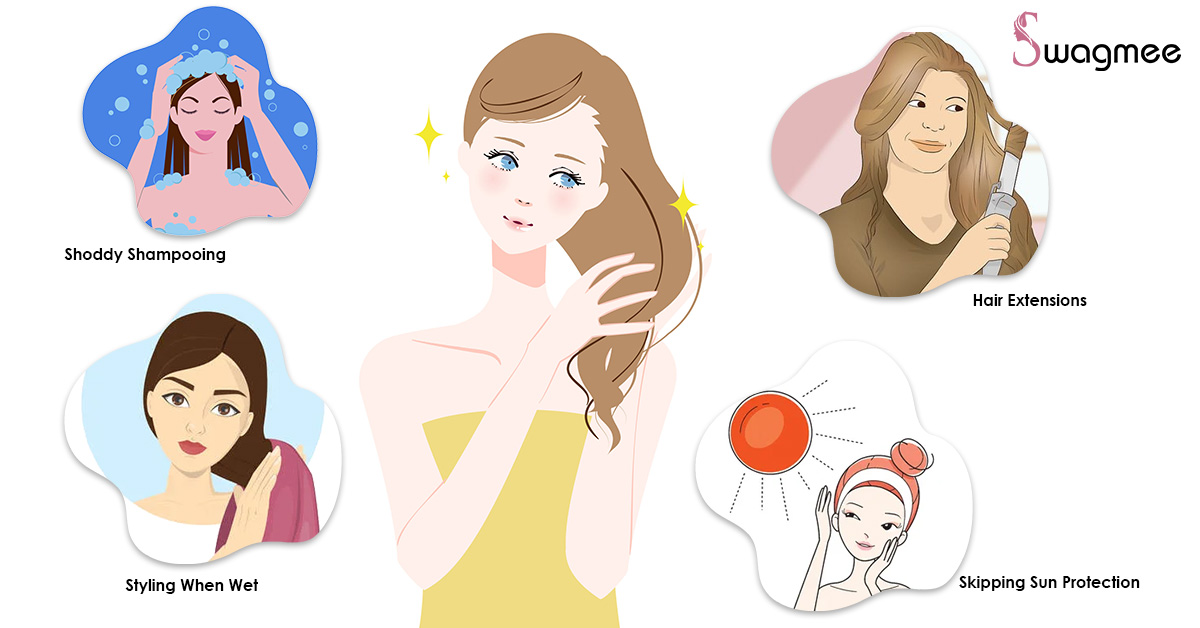Stress can have a profound impact on various aspects of health, including hair health. Understanding how stress affects your hair can help you take proactive steps to mitigate its effects and maintain healthy locks. Here’s a detailed exploration of the connection between stress and hair health:
How Stress Affects Hair Health
1. Hair Loss Types Associated with Stress
- Telogen Effluvium: This is the most common type of hair loss related to stress. It occurs when a significant stressor pushes a large number of hair follicles into the resting (telogen) phase, leading to noticeable shedding several months later. This condition is usually temporary, and hair often regrows once the stressor is addressed.
- Alopecia Areata: This autoimmune condition can be triggered by extreme stress, causing sudden patches of hair loss. The body mistakenly attacks hair follicles, leading to hair falling out in small, round patches.
- Trichotillomania: This is a psychological condition characterized by the compulsive urge to pull out one’s hair, often as a response to stress or anxiety. This can result in noticeable bald patches and damage to the hair.
2. Hormonal Changes
Stress activates the body’s fight-or-flight response, leading to the release of stress hormones like cortisol and adrenaline. Elevated cortisol levels can disrupt the hair growth cycle, leading to hair thinning or loss. Prolonged stress can also affect other hormones, further complicating hair health.
3. Reduced Blood Circulation
Stress can lead to constricted blood vessels, reducing blood flow to the scalp and hair follicles. Adequate blood circulation is essential for delivering oxygen and nutrients that promote healthy hair growth. Reduced circulation can weaken hair follicles, leading to increased shedding and slower regrowth.
4. Nutritional Deficiencies
Stress can impact eating habits, leading to poor nutrition or unhealthy food choices. A diet lacking essential vitamins and minerals, such as iron, biotin, and zinc, can adversely affect hair health. Additionally, stress may increase the body’s need for certain nutrients, compounding the effects of dietary deficiencies.
5. Increased Oil Production
Stress can lead to an increase in oil production on the scalp, resulting in an oily scalp and potential buildup. This can lead to issues like dandruff and an unhealthy scalp environment, which can hinder hair growth.
Recognizing the Signs of Stress-Related Hair Issues
- Increased Hair Shedding: Noticing more hair in your brush or on your pillow may indicate stress.
- Changes in Hair Texture: Hair may become thinner, weaker, or change in texture during periods of high stress.
- Bald Patches: Sudden bald spots or patches can be a sign of stress-related conditions like alopecia areata.
Managing Stress for Healthy Hair
- Practice Relaxation Techniques:
- Engage in mindfulness practices such as meditation, yoga, or deep-breathing exercises to help reduce stress levels.
- Regular Exercise:
- Physical activity is a great way to relieve stress. Aim for at least 30 minutes of exercise several times a week to boost your mood and improve overall health.
- Balanced Diet:
- Ensure you’re consuming a well-rounded diet rich in vitamins and minerals essential for hair health. Include foods high in antioxidants, omega-3 fatty acids, and protein.
- Adequate Sleep:
- Prioritize getting enough restful sleep each night. Lack of sleep can exacerbate stress and negatively impact hair health.
- Stay Hydrated:
- Drink plenty of water to keep your body and scalp hydrated. Hydration plays a crucial role in maintaining healthy hair.
- Seek Professional Help:
- If stress becomes overwhelming, consider talking to a mental health professional. Therapy or counseling can provide effective coping strategies.
The relationship between stress and hair health is significant and complex. By recognizing the impact of .agement not only benefits your hair but also enhances your quality of life.




